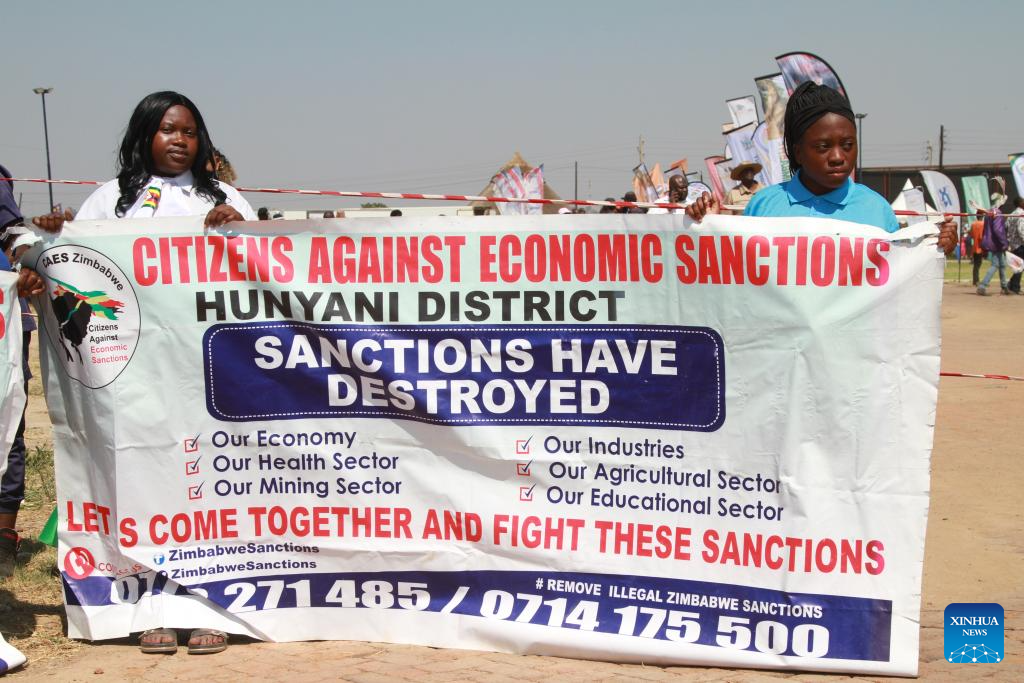
Zimbabwean youth hold up a poster to oppose Western sanctions in Harare, Zimbabwe, on Oct. 25, 2025. Zimbabweans on Saturday marked Anti-Sanctions Day in Harare, the country's capital, calling for the unconditional removal of Western sanctions imposed on the country over two decades ago.(Photo by Tafara Mugwara/Xinhua)
HARARE, Oct. 25 (Xinhua) -- Zimbabweans on Saturday marked Anti-Sanctions Day in Harare, the country's capital, calling for the unconditional removal of Western sanctions imposed on the country over two decades ago.
The SADC Anti-Sanctions Day, commemorated on Oct. 25, was established by the Southern African Development Community (SADC), a 16-member regional organization, in 2019 as a collective regional initiative to denounce the sanctions, which were imposed on Zimbabwe following the country's land reform program that redistributed land from minority white farmers to indigenous black Zimbabweans.
In his keynote address at the event, Zimbabwean President Emmerson Mnangagwa called for the complete and unconditional removal of the sanctions, saying that the country remains resolute in developing in the face of the illegal sanctions.
"Through sanctions, some Western countries sought to punish us for asserting our sovereignty and pursuing equal economic development for the benefit and prosperity of the people of our beloved motherland, Zimbabwe," Mnangagwa said at the event, which was widely attended by government officials, members of the diplomatic community, business leaders, and Zimbabweans from all walks of life.
Mnangagwa said that despite the negative effects and other challenges and shocks such as climate change-induced droughts and public health emergencies, the national economy has been on a positive growth trajectory.
"Over the years, we have made tremendous progress in our efforts to promote a self-sufficient and food-secure nation. Comprehensive people-centered programs and projects have been put in place to enhance our agricultural productivity. Climate-proofing our agriculture has seen the country attain food self-sufficiency," he said.
Mnangagwa said that in navigating the path toward sustainable economic development, Zimbabwe requires access to flexible and reliable lines of credit, which are hindered by sanctions.
"Regrettably, the illegal economic sanctions have fundamentally disrupted the ability of our country to access global lines of credit. To ensure the continuity of our developmental agenda, my administration has adopted home-grown, innovative development financing models to drive our country forward," said the president.
Despite the challenges posed by the sanctions, the country remains committed to multilateralism and international cooperation toward the realization of global peace, security, justice and equitable development, he added.
Martin Zharare, executive director of Citizens Against Economic Sanctions, an anti-sanctions lobby group, said sanctions should be removed unconditionally as they impede economic growth.
"The people of Zimbabwe stand with the government's position and say we are not going to support any initiative to have sanctions removed with conditions. We are standing firm to say the sanctions must be removed unconditionally," Zharare said.
The United States imposed sanctions on Zimbabwe in 2001 through the Zimbabwe Democracy and Economic Recovery Act, which restricted multilateral financing to the country.
In March last year, former U.S. President Joe Biden signed an executive order terminating the Zimbabwe sanctions program that had been in force since 2003 but immediately imposed sanctions on 11 individuals, including Mnangagwa and Vice President Constantino Chiwenga, over alleged human rights abuses and corruption under the Global Magnitsky Human Rights Accountability Act. ■
